Cite this document
(“Research paper based on millennial generation Example | Topics and Well Written Essays - 1250 words”, n.d.)
Retrieved from https://studentshare.org/management/1650982-research-paper-based-on-millennial-generation
Retrieved from https://studentshare.org/management/1650982-research-paper-based-on-millennial-generation
(Research Paper Based on Millennial Generation Example | Topics and Well Written Essays - 1250 Words)
https://studentshare.org/management/1650982-research-paper-based-on-millennial-generation.
https://studentshare.org/management/1650982-research-paper-based-on-millennial-generation.
“Research Paper Based on Millennial Generation Example | Topics and Well Written Essays - 1250 Words”, n.d. https://studentshare.org/management/1650982-research-paper-based-on-millennial-generation.


